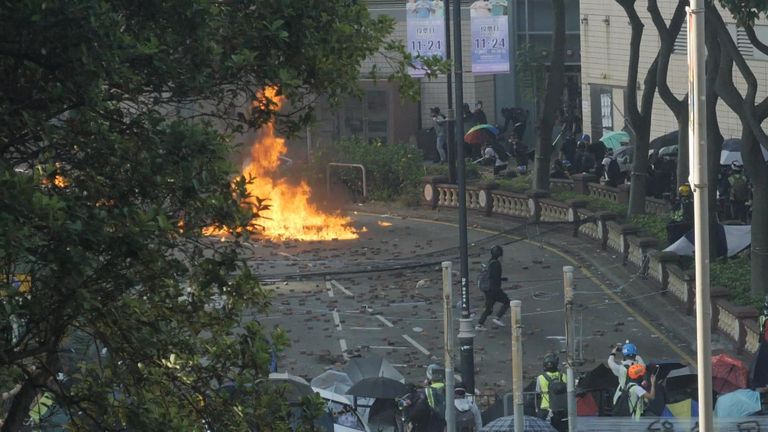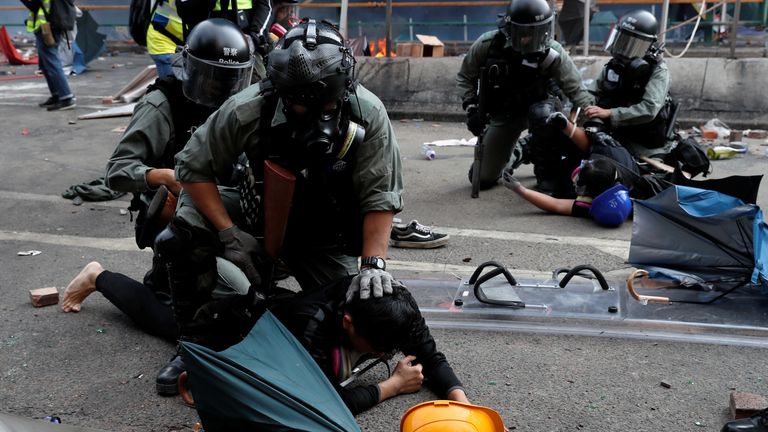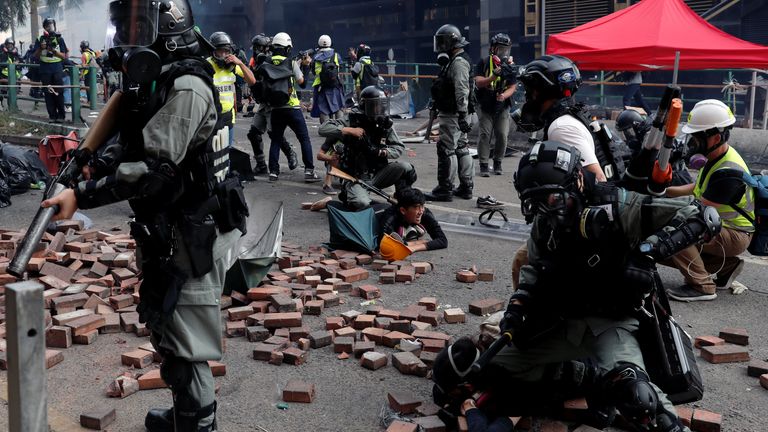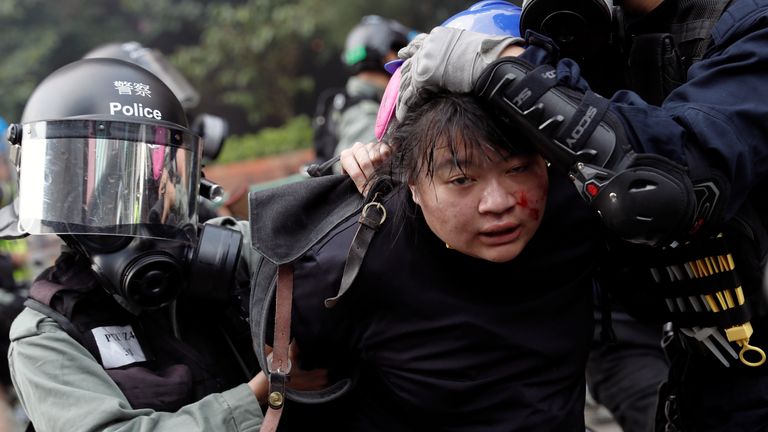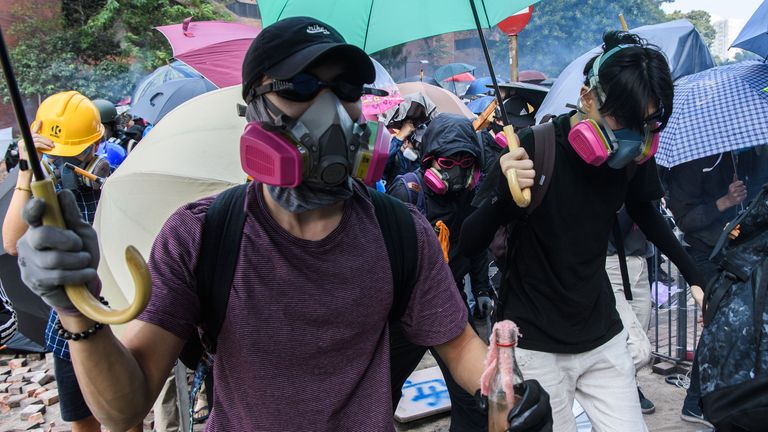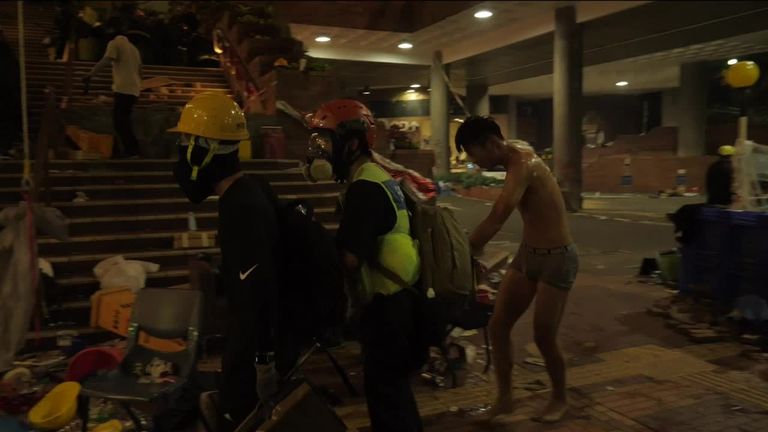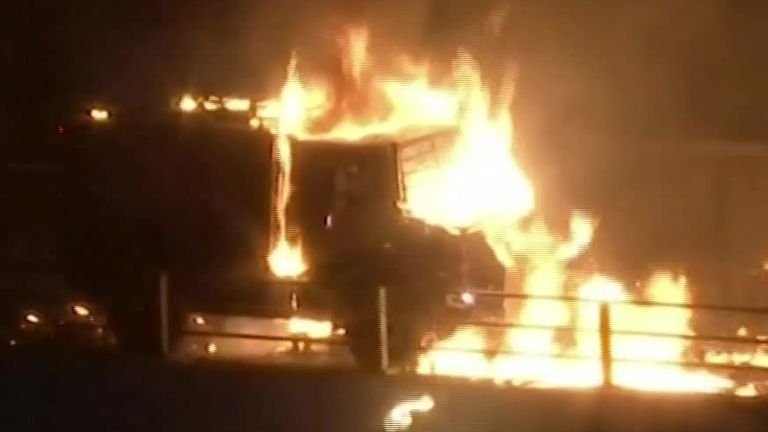Hong Kong protesters abseil from bridge to escape police siege at university campus
Demonstrators at Polytechnic University fired arrows and catapulted petrol bombs at police who deployed tear gas and water cannon.
Tuesday 19 November 2019 16:53, UK
Protesters in Hong Kong have abseiled down from a bridge outside a besieged university campus in a bid to escape from police.
Around 200 demonstrators have occupied Polytechnic University over the last few days, but as night fell on Monday they began their attempts to flee after being bombarded by tear gas and rubber bullets.
In response the activists fired arrows and catapulted petrol bombs towards the officers, who had surrounded the campus determined to arrest those who have been holed up inside it.
Pictures and video from the scene showed protesters lowering themselves down from a bridge and on to a highway, desperately holding on as they made their way to the ground.
Some carried one another on their backs to help them escape, while others were seen hugging before hopping on the back of motorbikes that were waiting to take them away from the police bombardment.
The latest drama came after the Chinese ambassador to the UK said the escalation of violence in the former British territory had "pushed Hong Kong into an extremely dangerous situation".
Liu Xiaoming warned the city faced an "unimaginable and dreadful" future if the unrest continued, and also claimed foreign countries - including the US and UK - should stop interfering in Hong Kong affairs.
The UK government remains "seriously concerned" about events in Hong Kong and urges for "calm and restraint", according to a spokesman for Prime Minister Boris Johnson.
Sky's Asia correspondent Tom Cheshire, who has been inside the university campus in Hong Kong, said there was "layer after layer of defence" for police to get through after breaking through the first barricades.
He said protesters had been trying to get out of the university because "they think there's not a future here and the best thing they can do is chance it with the police".
"There are running battles all around campus," he added.
Police had earlier threatened to use live bullets if protesters remained at the campus.
Dozens of protesters tried to leave after reassurances from the university's president, who said police had agreed to suspend the use of force.
Jin-Guang Teng said that he would accompany any protesters to the police station to ensure their cases would be processed fairly, and added: "I hope that you will accept the proposed temporary suspension of force and leave the campus in a peaceful manner."
One protester named Dan, 19, said: "We've been trapped here for too long.
"We need all Hong Kongers to know we need help.
"I don't know how much longer we can go on like this. We may need international help."
The violence seen over the past few days has been among the worst in six months of demonstrations, with 38 people injured on Sunday alone, the hospital authority said.
A police media liaison officer was treated in hospital after being hit in the leg with an arrow as the clashes spread across the central Kowloon district.
Police said the protesters' activities had "escalated to rioting", adding: "Rioters continue to launch hard objects and petrol bombs with large catapults at police officers."
On Saturday, dozens of Chinese troops, wearing shorts and T-shirts, picked up paving stones, rocks and other obstacles that had cluttered the street near another university.
The military is allowed to help maintain public order, but only at the request of the Hong Kong government.
The government said it had not asked for the military's assistance, calling it a voluntary community activity. But their presence on the streets risks stoking tensions further.
:: Listen to the Daily podcast on , , ,
On Monday, Hong Kong's high court struck down a face mask ban aimed at protesters trying to hide their identity to avoid arrest.
The court said that the ban infringes on fundamental rights.
The government used its emergency powers to impose the ban last month.
The court said it did not consider anti-mask laws unconstitutional in general, but in this case, the law infringed on fundamental rights further than was reasonably necessary.
The Hong Kong protests were sparked by proposed legislation that would have allowed criminal suspects to be extradited to mainland China.
The bill has been withdrawn, but the protests have spread into a wider resistance movement against Beijing's perceived growing control, along with calls for full democracy for the territory.










